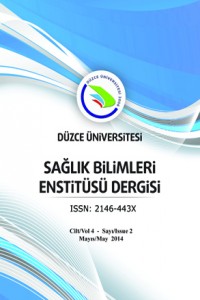Öz
In the study, some important methods such as; ANOVA, Henderson III, ML, REML and MINQUE which are commonly used in literature to estimate variance components, were aimed to investigate comparatively for balanced and unbalanced data in animal science. In accordance with the experiment, this study designed with not only the data obtained from the eggs of two commercial layer herds aged 28-week (young) and 80-week (old) which were stored under different storage time and conditions but also with interactive and non-interactive models. In this context, variance components related with effects of hen age, storage time and conditions on Haugh unit which is an important indicator of internal quality characteristic in eggs was used in the interactive model and egg weight was used in the non-interactive model were estimated with five methods (ANOVA, Henderson III, ML, REML, MINQUE). In balanced data, though the estimation of variance components in four methods were found equal to each other, error variance ratio in ML method was found higher. In unbalanced data, for the interactive model, though explanation rates of error variance to total variance are calculated approximately %14 for the methods ANOVA, REML and MINQUE; ML (%18,32) and Henderson III (%17,39) was found higher. Also for the non-interactive model, the rate of error variance in ANOVA, Henderson III, REML and MINQUE methods was found approximately %27 but for ML it was found %42,16. According to research results, it is suggested that for the data in which balanced and normal distribution do not exist, other methods should be used except from ML, however, depending on data structure in unbalanced data it should be benefitted from REML method on condition that degree of freedom is low. It is expected that the research results will contribute to the statistical literature as well as the researchers in different areas in need of these methods.
Kaynakça
- Fisher RA. Statistical Methods for Research Workers. Edinburgh and London: Oliver & Boyd; 1925.
- Crump SL. The Estimation of Variance Components in Analysis of Variance. Biometrics. 1946; 2(1):7-11. Henderson CR. Estimation of Variance and Covariance Components. Biometrics. 1953; 9(2): 223-52.
- Searle SR, Casella G, McCulloch CE. Variance components. New Jersey: A John Wiley & Sons Inc.; 200 Sahai H, Ojeda MM. Analysis of Variance for Random Models, Volume II: Unbalanced Data. Boston, Basel, Berlin: Birkhäuser; 2005.
- Searle SR. Linear Models. New York: A John Wiley & Sons Inc.; 1971.
- Hartley H O, Searle SR. A Discontinuity in Mixed Model Analysis. Biometrics. 1969; 25(3): 573-6.
Öz
Araştırmada, varyans bileşenlerinin tahmin edilmesinde literatürde yaygın olarak kullanılan yöntemlerden; ANOVA,Henderson III, ML, REML, MINQUE gibi önemli yöntemlerin dengeli ve dengeli olmayan veriler için karşılaştırmalıolarak incelenmesi amaçlanmıştır. Çalışmada, yaşları 28 ve 80 haftalık olan iki ticari yumurtacı sürüden elde edilentoplam 696 adet sofralık yumurtaya ait veriler kullanılarak etkileşimli ve etkileşimsiz modeller düzenlenmiştir. Haughbirimi ve yumurta ağırlığı üzerine depolama süresi, depolama koşulu ve ana yaşına ilişkin varyans bileşenleri beş yöntemile tahmin edilmiştir (ANOVA, Henderson III, ML, REML, MINQUE). Dengeli verilerde, varyans bileşenleri tahminidört yöntemde birbirine eşit bulunmasına rağmen ML yönteminde hata varyans oranı yüksek bulunmuştur. Etkileşimlimodel için dengeli verilerde, hata varyansının toplam varyansı açıklama oranı ANOVA, REML ve MINQUE yöntemleriiçin yaklaşık olarak %14 bulunmuşken, ML (%18,32) ve Henderson III (%17,39) yöntemlerinde yüksek bulunmuştur.Etkileşimsiz modelde ise ANOVA, Henderson III, REML ve MINQUE yöntemlerinde hata varyansı oranı yaklaşık %27bulunmuş fakat ML yönteminde %42,16 bulunmuştur. Çalışma sonuçlarına göre, dengeli ve normal dağılım varsayımıgerçekleşmeyen verilerde ML hariç diğer yöntemlerin kullanılabileceği, bununla birlikte verinin yapısına bağlı olarakdengeli olmayan verilerde ve serbestlik derecesinin düşük olması durumunda REML yönteminden yararlanılmasıönerilmiştir.
Kaynakça
- Fisher RA. Statistical Methods for Research Workers. Edinburgh and London: Oliver & Boyd; 1925.
- Crump SL. The Estimation of Variance Components in Analysis of Variance. Biometrics. 1946; 2(1):7-11. Henderson CR. Estimation of Variance and Covariance Components. Biometrics. 1953; 9(2): 223-52.
- Searle SR, Casella G, McCulloch CE. Variance components. New Jersey: A John Wiley & Sons Inc.; 200 Sahai H, Ojeda MM. Analysis of Variance for Random Models, Volume II: Unbalanced Data. Boston, Basel, Berlin: Birkhäuser; 2005.
- Searle SR. Linear Models. New York: A John Wiley & Sons Inc.; 1971.
- Hartley H O, Searle SR. A Discontinuity in Mixed Model Analysis. Biometrics. 1969; 25(3): 573-6.
Ayrıntılar
| Birincil Dil | İngilizce |
|---|---|
| Bölüm | Araştırma Makaleleri |
| Yazarlar | |
| Yayımlanma Tarihi | 15 Mayıs 2014 |
| Gönderilme Tarihi | 16 Aralık 2013 |
| Yayımlandığı Sayı | Yıl 2014 Cilt: 1 Sayı: 2 |



